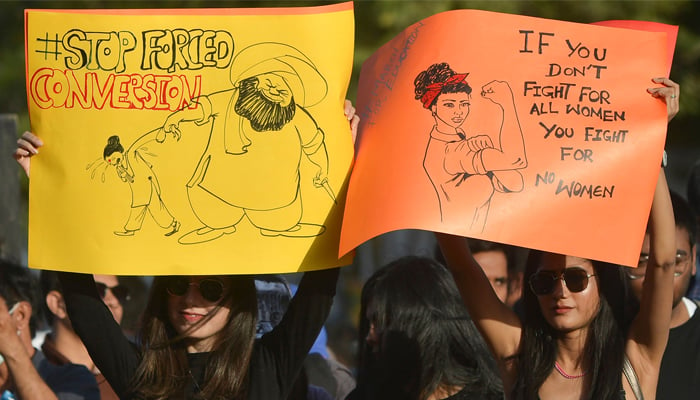Women lament lack of implementation of existing laws, misogynistic mindset in Pakistan
Number of women parliamentarians should be increased for better representation in policy-making, the activist said
March 16, 2020

KARACHI: Women from various sections of the society have lamented the lack of implementation of existing laws related to protection of women and other gender minorities, as well as the misogynistic mindset in Pakistan.
While some of these women appreciated the introduction of pro-women laws and the government's efforts from time to time, they expressed regret that how the implementation of pro-women legislation was always impeded.
One of the organisers of Aurat March on International Women Day, Qurat Mirza, told APP that there were laws to prevent domestic violence but housewives continued to become victims of the menace due to the so-called norms of the society.
Similarly, Mirza added, society ignored the women household workers despite their labour to their respective families by doing domestic chores at nominal wages and sometimes had to face violence from their employers.
"In this year’s women march, we demanded social security for housewives and recognition of the labour of household workers,” Mirza said, adding that every province had different laws related to women. Sindh had more direct laws in that regard, which should be replicated by other provinces.
Only two women MLOs in Karachi
Mirza added that the implementation and procedural definitions of the existing women-related laws were important. Without training and capacity building of the officials concerned, the implementation of such laws would remain a challenge for the government, she added.
She emphasised the need to increase the number of women medico-legal officers (MLO), pointing out that there were only two woman officers in the mega city of Karachi. There was need to replace the out-dated mechanism of medico-legal examination.
The activist said number of women parliamentarians should also be increased, so that they could have representation in the policy-making. Women could be empowered by ensuring their full access to education, basic health facilities, and active participation in politics, besides implementation of the relevant laws in letter and spirit, she added.
Zahra Khan, who works for the Home-Based Women Worker Federation (HBWWF) said the implementation of existing women-related laws — instead of doing fresh legislation — was imperative for their empowerment.
No harassment committees
Khan cited the example of Protection Against Harassment of Women at the Workplace Act — which was enacted in 2010 — but unfortunately a large number of federal and provincial institutions and departments, besides the private organisations, had not formed mandatory inquiry committees to address harassment cases despite passage of a decade.
She underscored that the misogynistic mindset was one of the major impediments in the implementation of women laws, with influential and feudal landlords openly flouting the law. She also criticised how major political parties did not take the issues of women seriously.
"Mere introduction of laws and formation of committees cannot end discrimination against women, rather their implementation in total was required for which the mindset in the political parties in particular and the society as a whole should be changed," she said.
The misogynistic mindset deprived the women of their right to education, work, and marry by their choice, she added, noting how although voices were being raised against the oppressive and feudal system based on misogynistic culture, there was still a long way for the women to traverse for attaining their goals.
Change the misogynist mindset
Mahin Hunain, a housewife, said the major challenges faced by the women were gender discrimination, harassment, honour killing, and underage or forced marriages. Laws in that regard were presented but their proper implementation was a big issue.
According to her, lack of awareness among women about their rights and laws, besides of cultural barriers were major impediments to the execution of existing laws, she added.
Hunain urged the media to play their due role in creating awareness among the people, particularly women, regarding women-related laws. Seminars and lectures in educational institutions on the issue could help change the misogynist mindset, she added.
She appealed to the government to make more concerted efforts for increasing literacy rate of women.
A surgeon at a private hospital, requesting anonymity, said women should be given due role in decision-making at every level. In today’s modern era, women of rural areas were deprived of their basic rights of education, health and inheritance. The implementation of existing laws was of utmost importance for the betterment of women, she added.
Male-dominated society impediment to laws
Housewife Sadia Zaidi highlighted domestic violence related issues being faced by the women. She said the victims did not get any sympathy from the society. She criticised that police officers particularly male officers are non-supportive to women approaching police stations seeking help in cases of domestic violence.
She suggested that the content related to gender equality should be included in the syllabus at educational institutions. The practice of under-age marriages should be discouraged, Zaidi added.
A teacher at a private school, Rafia Sheikh, opined that men get more opportunities as compared to women in practical life.
She said working women face difficulty in balancing their work, life, and household responsibilities. Male-dominated society, illiteracy, and unawareness are the impediments to the execution of existing laws, added Sheikh.









